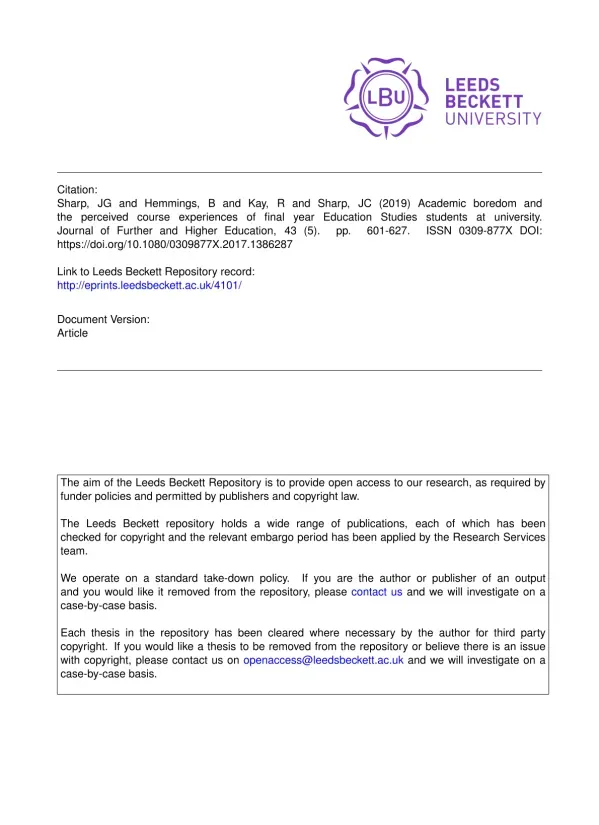
Exploring Academic Boredom and Course Experiences Among Final Year Education Studies Students
Document information
| Author | John G. Sharp |
| instructor | Professor John G. Sharp |
| School | Leeds Beckett University |
| Major | Education Studies |
| Year of publication | 2019 |
| Place | Leeds |
| Document type | article |
| Language | English |
| Number of pages | 54 |
| Format | |
| Size | 862.19 KB |
- academic boredom
- education studies
- student engagement
Summary
I. Introduction to Academic Boredom
Academic boredom is a prevalent issue among university students, particularly in the context of Education Studies. The phenomenon manifests through various observable behaviors, such as drowsiness and disengagement during lectures. Research indicates that academic boredom is not merely a trivial concern; it can lead to significant emotional and psychological consequences. As noted, 'students really do get bored at university,' highlighting the need for deeper understanding and intervention. The study explores the relationship between academic boredom and students' perceived course experiences, revealing that traditional lecture formats often trigger boredom. This understanding is crucial for educators aiming to enhance student engagement and learning outcomes. The findings suggest that boredom is not just a personal experience but a systemic issue that can affect overall academic performance. Addressing this challenge requires a comprehensive approach that considers both the emotional and educational dimensions of student experiences.
1.1. The Impact of Boredom on Learning
The implications of academic boredom extend beyond mere distraction. It is associated with a range of negative outcomes, including decreased motivation and lower academic achievement. The study reveals that 'academic boredom is a largely negative and disabling achievement-related emotion,' emphasizing its critical role in the educational landscape. Students exhibiting higher levels of boredom tend to adopt less effective learning strategies, which can hinder their academic success. This relationship underscores the importance of creating stimulating learning environments that foster engagement. By recognizing the signs of boredom and understanding its triggers, educators can implement strategies to mitigate its effects. This proactive approach not only enhances student satisfaction but also promotes deeper learning and retention of knowledge.
II. Methodology and Data Collection
The research employs a mixed-methods design, integrating quantitative and qualitative data to provide a comprehensive analysis of academic boredom among final year Education Studies students. A combination of questionnaires and individual interviews was utilized to gather insights from 179 participants. This methodological approach allows for a nuanced understanding of students' experiences and perceptions. The findings indicate that traditional lectures and assignment completion are significant triggers for boredom. As stated, 'all participants exhibited some measurable disposition towards academic boredom,' highlighting the widespread nature of this issue. The use of cluster analysis further reveals distinct profiles among students, identifying those who are more engaged versus those who are less effective learners. This segmentation is vital for tailoring educational interventions that address the specific needs of different student groups.
2.1. Analysis Techniques
Path analysis was employed to explore the complex interconnections between academic boredom and various educational factors. The results indicate that academic boredom is a strong predictor of surface learning approaches and organized effort. This finding is significant as it suggests that boredom not only affects immediate engagement but also has long-term implications for academic outcomes. The study's mixed-methods approach enriches the data, providing a holistic view of the educational experience. By combining quantitative metrics with qualitative insights, the research offers valuable recommendations for educators seeking to enhance student engagement and reduce boredom. The implications of these findings extend to curriculum design, teaching methods, and overall educational policy.
III. Implications for Educational Practice
The findings of this study have profound implications for educational practice. Understanding the dynamics of academic boredom can inform the development of more engaging curricula and teaching strategies. The research suggests that traditional lecture formats may not adequately meet the needs of all students, leading to disengagement and boredom. As noted, 'the cumulative effects of academic boredom are far from trivial,' indicating a pressing need for reform in teaching methodologies. Educators are encouraged to adopt more interactive and student-centered approaches that promote active learning. This shift not only addresses boredom but also enhances overall student satisfaction and academic performance. The study advocates for ongoing research into boredom mitigation strategies, emphasizing the importance of adapting educational practices to foster a more engaging learning environment.
3.1. Future Research Directions
Future research should explore the long-term effects of academic boredom on student outcomes and the effectiveness of various intervention strategies. Investigating the role of technology and innovative teaching methods in reducing boredom could provide valuable insights. Additionally, examining the experiences of diverse student populations may reveal unique challenges and solutions. The study's findings serve as a foundation for further exploration into the complexities of student engagement and boredom in higher education. By prioritizing this area of research, educators and policymakers can work towards creating more inclusive and stimulating educational environments that cater to the diverse needs of all students.
Document reference
- Academic boredom and the perceived course experiences of final year Education Studies students at university (Sharp, JG and Hemmings, B and Kay, R and Sharp, JC)
- Academic boredom: A critical review of the literature (Pekrun, R and Stevens, B)
- Boredom in the classroom: A review of the literature (Mann, S and Robinson, A)
- The role of boredom in academic performance (Vodanovich, S)
- Control-Value Theory: A framework for understanding academic emotions (Pekrun, R)
